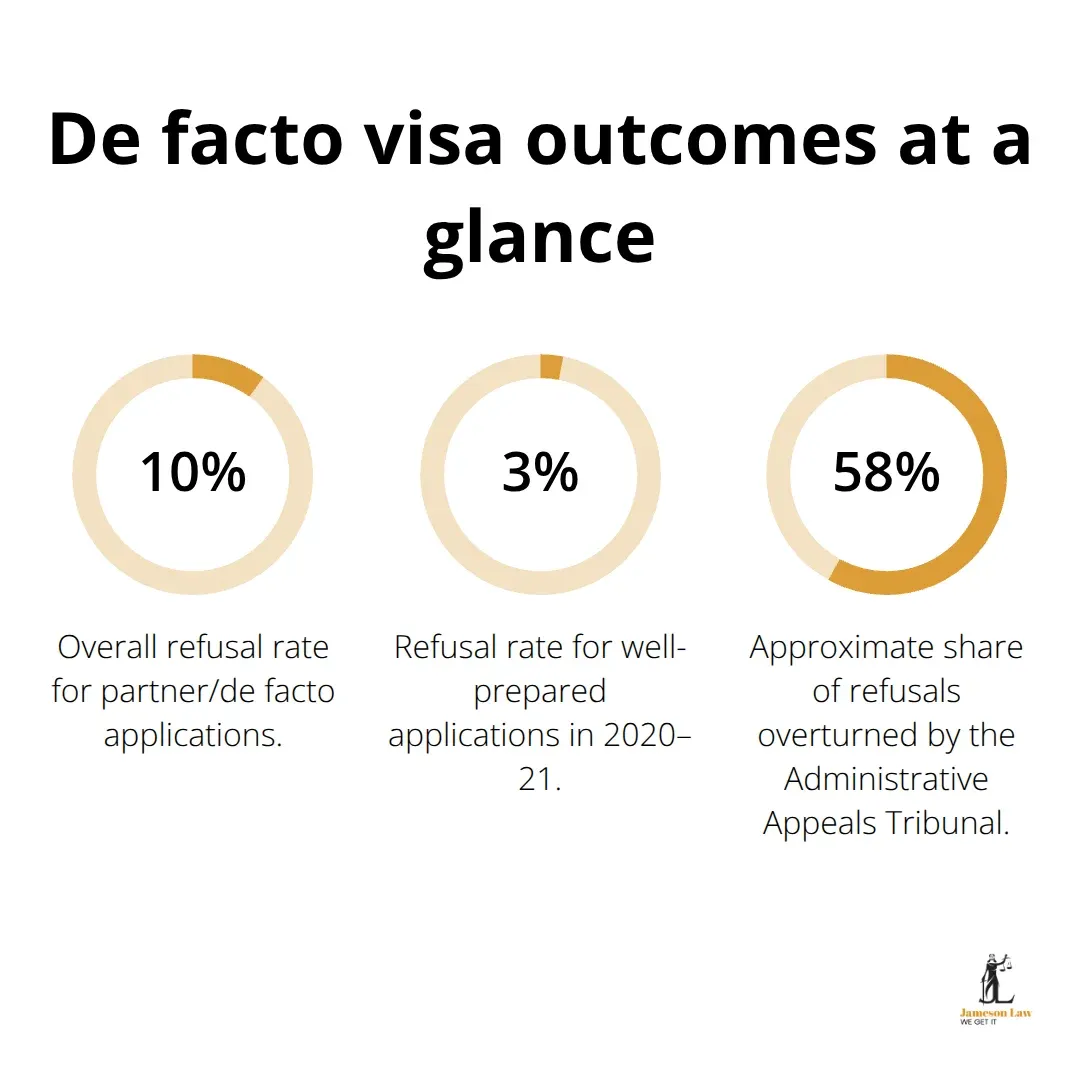Australia’s de facto visa Australia requirements can feel overwhelming for couples navigating the immigration process. The documentation standards are strict, and one missing piece of evidence can delay your application for months.
We at Jameson Law, as experienced immigration lawyers in Sydney, see couples struggle with proving their genuine relationship every day. This guide breaks down exactly what immigration officers look for and how to build a bulletproof application.
Which De Facto Visa Category Fits Your Situation?
Partner Visa Subclass 820/801 for Established Relationships
The Partner Visa Subclass 820/801 pathway serves couples who already live together in Australia. This two-stage process begins with the temporary 820 visa, then moves to permanent residency through the 801 visa after two years. The Department of Home Affairs processed over 72,000 partner visas in recent years to address backlogs.
Your relationship must exist for at least 12 months before you apply (unless you have children together or register your relationship in NSW). Processing times currently stretch 24-31 months. The application fee sits at approximately $9,000, which makes thorough preparation essential to avoid costly refusals.

Prospective Marriage Visa Subclass 300 Alternative
The Prospective Marriage Visa Subclass 300 suits couples who plan to marry within nine months of arrival in Australia. Current processing times range 23-27 months. This visa requires proof of genuine intention to marry and ongoing relationship commitment but allows entry before you establish the 12-month cohabitation requirement often needed for de facto visa Australia requirements.
Strategic Differences Between Marriage and De Facto Applications
Married couples typically present stronger applications because marriage certificates provide concrete legal recognition. However, de facto relationships require extensive evidence across four key areas: financial interdependence, household arrangements, social recognition, and commitment. Immigration officers scrutinise de facto applications intensively, demanding documentation that spans the relationship’s entire duration.
What Evidence Proves Your De Facto Relationship?
Immigration officers examine four specific evidence categories to verify your authenticity. Financial interdependence carries the heaviest weight, followed by household arrangements. The Department expects comprehensive documentation spanning your entire timeline.
Financial Interdependence Documentation
Joint bank accounts represent the strongest financial evidence. Shared mortgage documents, rental agreements in Sydney or NSW with both names, and joint loan applications demonstrate committed financial partnership. Include utility bills and insurance policies that show shared responsibility.
Tax returns listing your partner as a dependant strengthen your case. Avoid presenting only recent financial arrangements—officers look for patterns of progressive financial integration. Money transfers and shared investments provide additional compelling evidence.

Social Recognition and Community Evidence
Statutory declarations (Form 888) from Australian citizens or permanent residents who know your relationship carry substantial weight. These declarations must detail specific observations about your relationship dynamics. Photographic evidence should span your relationship duration, showing attendance at family gatherings and social events.
Household and Domestic Arrangements
Include evidence of shared household responsibilities through joint shopping receipts and shared vehicle registration. Lease agreements and utility connections to the same address establish cohabitation patterns essential for de facto visa Australia requirements. Officers look for evidence that both partners contribute to household management.
What Derails De Facto Visa Applications?
Relationship Evidence Gaps That Trigger Refusals
Most refusals stem from inadequate evidence presentation. The Department expects evidence across all four categories. Officers question authenticity when couples maintain completely separate finances without explanation. Couples who split expenses must provide alternative evidence like shared utility bills or joint purchases.
Health Checks and Character Requirements That Cause Delays
Health examinations must occur within 12 months of application lodgement. Character requirements demand police checks from every country where you lived for 12 months or more. Missing police certificates will pause your application indefinitely. Character waivers exist but demand compelling evidence that your relationship outweighs past issues.
Processing Disparities That Extend Wait Times
Processing delays intensify when officers request additional character evidence. The Department processes applications from certain countries faster than others, creating disparities in family reunion timelines. These differences affect couples’ ability to plan their future together in Australia.
Final Thoughts
Meeting de facto visa Australia requirements demands meticulous preparation across financial, household, social, and commitment categories. The Department processes applications with increased scrutiny, making comprehensive documentation your strongest defence. Start gathering evidence immediately and focus on joint financial arrangements.
Processing times currently stretch over two years. While the refusal rate is low for well-prepared applications, the Administrative Appeals Tribunal overturns a significant percentage of refusals, highlighting the value of proper initial preparation.
Complex immigration histories or insufficient evidence require professional assistance. We at Jameson Law help couples navigate the application process in Sydney and Parramatta. Professional guidance is essential when your future together depends on the right approach.














